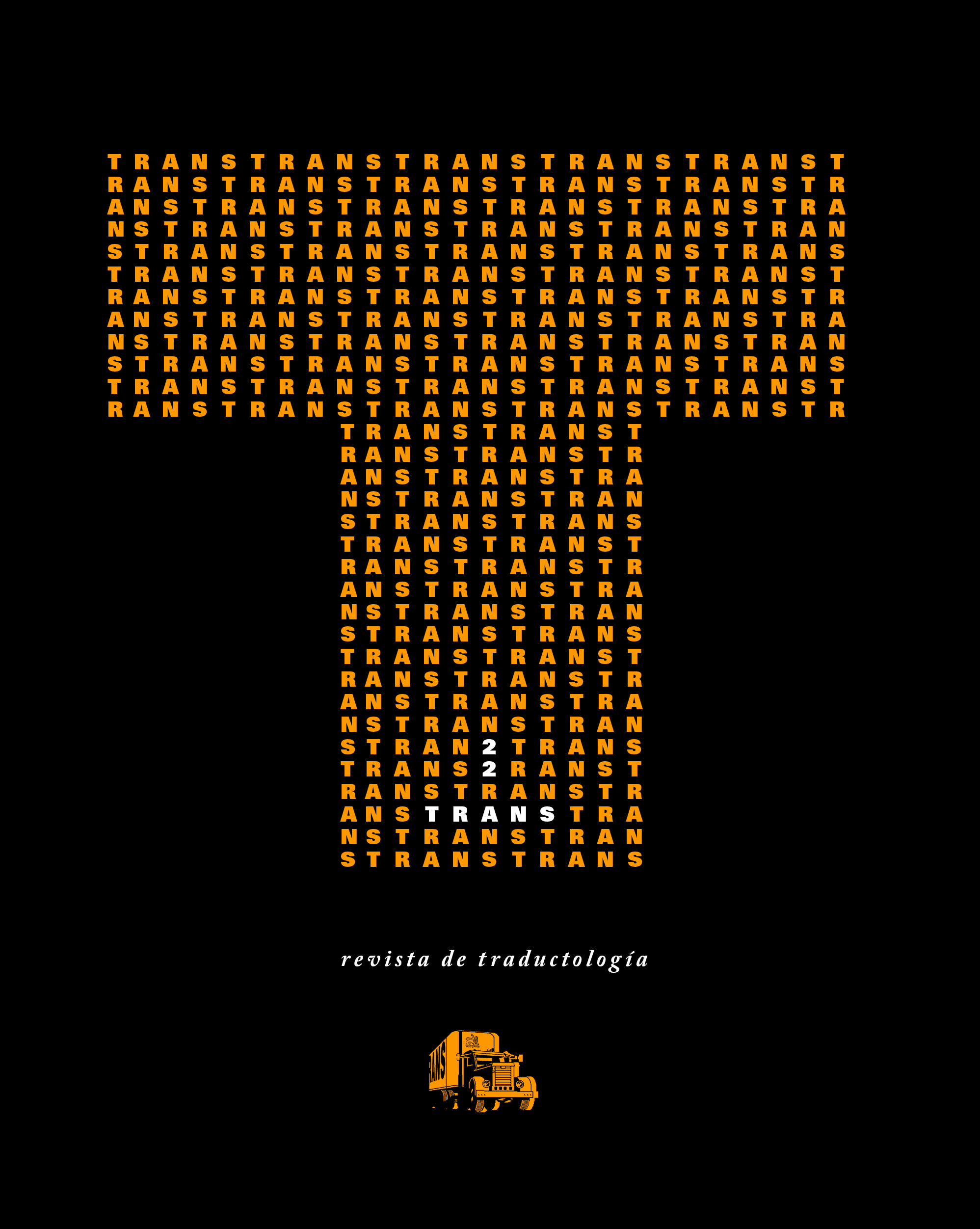Dubbing of Profilage: A case study
DOI:
https://doi.org/10.24310/TRANS.2018.v0i22.3021Keywords:
dubbing, series, descriptive studies, specialized professional service, ProfilageAbstract
This paper focuses on the analysis of the management of the Translation project for dubbing Profilage, a French fiction series (Robert y Lebarbier, 2009-2015). This study has two aims: first, to describe the process of Audiovisual Translation (avt), taking into account the interaction of the different agents of the process with the phases of the project (Ferrer, 2011). Second, to analyse the peculiarities of this avt project in French-Spanish combination by analysing 5 seasons of the mentioned series. This analysis will disclose translation rules present in the crime procedural genre.
Downloads
Metrics
Publication Facts
Reviewer profiles N/A
Author statements
Indexed in
-
—
- Academic society
- N/A
- Publisher
- Universidad de Málaga
References
ALCARAZ VARÓ, Enrique y Brian HUGHES (2002): El español jurídico, Barcelona: Ariel Derecho.
ÁVILA, Alejandro (1997): El doblaje, Madrid: Cátedra.
CHAUME, Frederic (2003): Doblatge i subtitulació per a la TV, Vic: Eumo.
CHAUME, Frederic (2004): Cine y Traducción, Madrid: Cátedra.
CHAUME, Frederic (2005): «Los estándares de calidad y la recepción en la traducción audiovisual», Puentes, 6, 5-12.
CHAUME, Frederic (2007): «Dubbing practices in Europe: Localisation beats globalisation», Linguistica Antverpiensia, 6, 201-217.
CHAUME, Frederic y GARCÍA DE TORO, Cristina (2010): Teories actuals de la traductologia, Valencia: Bromera.
CHAUME, Frederic (2012): Audiovisual Translation: Dubbing, Manchester, St Jerome.
CHAVES, María Jesús (2000): La traducción cinematográfica. El doblaje, Huelva: Publicaciones de la Universidad de Huelva.
DEL ÁGUILA, María Eugenia y Emma RODERO (2005): El proceso del doblaje: take a take, Salamanca: Universidad Pontificia de Salamanca.
CHESTERMAN, Andrew (2009): «The Name and Nature of the Translator Studies», Hermes – Journal of Language and Communication Studies, 42, 13-22.
FERRER SIMÓ, María Rosario (2005a): «Fansub y scanlations: la influencia del aficionado en los criterios profesionales», Puentes, 6, 27-44.
FERRER SIMÓ, María Rosario (2005b): «La actividad del traductor autónomo», en Isabel GARCÍA IZQUIERDO (ed.), Experiencias de traducción: reflexiones desde la práctica traductora, Castellón: Publicacions de la Universitat Jaume I.
FERRER SIMÓ, María Rosario (2011): «L os servicios profesionales de TAV: la gestión del proyecto en tres modos audiovisuales», trabajo de investigación [inédito], Castellón: Universitat Jaume I.
FERRER SIMÓ, María Rosario (2012): «Los servicios de TAV profesional: pasado, presente y futuro», en Juan José MARTÍNEZ SIERRA (coord.), Reflexiones sobre la Traducción Audiovisual. Tres espectros, tres momentos, Valencia: PUV.
FERRER SIMÓ, María Rosario (2016): La gestión de proyectos de traducción audiovisual en España. Seis estudios de caso [Tesis no publicada], Castellón: Universitat Jaume I.
GAMERO PÉREZ, Silvia (2001): La traducción de textos técnicos, Barcelona: Ariel.
HERMANS, Hubert J. M. (1996): «Voicing the self: From information processing to dialogical interchange», Psychological Bulletin, 119, 31–50.
HERNANDO CUADRADO, Luís Alberto (2003): El lenguaje jurídico, Madrid: Editorial Verbum.
HOLMES, James S. (1988): Translated! Papers on Literary Translation and Translation Studies, Amsterdam: Rodopi.
KARAMITROGLOU, Fotios (1999): «Audiovisual Translation at the Dawn of the Digital Age: Prospects and Potentials», Translation Journal, 3/3, http://translationjournal.net/journal/09av.htm [consulta: 08-VIII-11].
KARAMITROGLOU, Fotios (2000): Towards a methodology for the investigation of norms in audiovisual translation, Amsterdam: Rodopi.
LUYKEN, Georg-Michael et al. (1991): Overcoming Language Barriers in Television: Dubbing and Subtitling for the European Audience, Dusseldorf: The European Institute for the media.
MAYORAL, Roberto (2002): «Nuevas perspectivas dela traducción audiovisual», Sendebar, 14, 107-26.
MARTÍ FERRIOL, José Luís (2006): Estudio descriptivo del método de traducción para el doblaje y la subtitulación [Tesis doctoral], Castellón: Universitat Jaume I.
MARTÍNEZ SIERRA, Juan José (2012): Introducción a la Traducción Audiovisual, Múrcia: Editum.
PYM, Anthony (2009): «Translator training», Proyecto para el Oxford Companion Translation Studies.
RICHART MARSET, Mabel (2012): Ideología y traducción: por un análisis genético del doblaje, Madrid: Biblioteca Nueva.
RICHART MARSET, Mabel (2013): «La caja negra y el mal de archivo: defensa de un análisis genético del doblaje cinematográfico», TRANS: Revista de Traductología, 17, 51-69.
TORRALBA, Glòria (2011): «La professió del traductor audiovisual: Descripció sociològica de la traducció per al doblatge», trabajo de investigación [inédito], Castellón: Universitat Jaume I.
WHITMAN-LINSEN, Candace (1992): Through the Dubbing Glass: The Synchronization of American Motion Pictures Into German, French and Spanish, Frankfurt am Main: Peter Lang Verlag.
Downloads
Published
How to Cite
Issue
Section
License
All contents published in TRANS. Revista de Traductología are protected under the Creative Commons Attribution-NonCommercial-ShareAlike 4.0 International (CC BY-NC-SA 4.0) license. All about this license is available in the following link: <http://creativecommons.org/licenses/by-nc-sa/4.0>
Users can copy, use, redistribute, share and exhibit publicly as long as:
- The original source and authorship of the material are cited (Journal, Publisher and URL of the work).
- It is not used for comercial purposes.
- The existence of the license and its especifications are mentioned.
- ShareAlike — If you remix, transform, or build upon the material, you must distribute your contributions under the same license as the original.
There are two sets of authors’ rights: moral and property rights. Moral rights are perpetual prerogatives, unrenounceable, not-transferable, unalienable, imprescriptible and inembargable. According to authors’ rights legislation, TRANS. Revista de Traductología recognizes and respects authors moral rights, as well as the ownership of property rights, which will be transferred to University of Malaga in open access.
The property rights are referred to the benefits that are gained by the use or the dissemination of works. TRANS. Revista de Traductología is published in an open access form and it is exclusively licenced by any means for doing or authorising distribution, dissemination, reproduction, , adaptation, translation or arrangement of works.
Authors are responsable for obtaining the necessary permission to use copyrighted images.













21.png)
